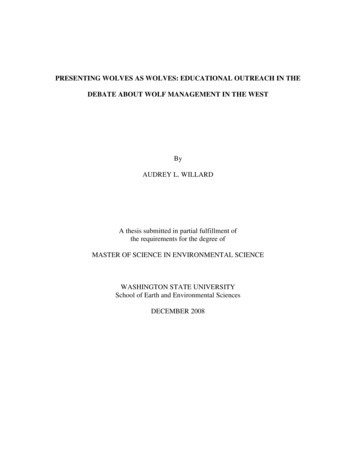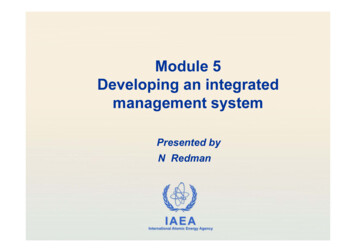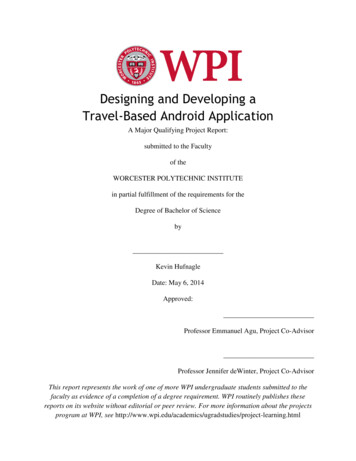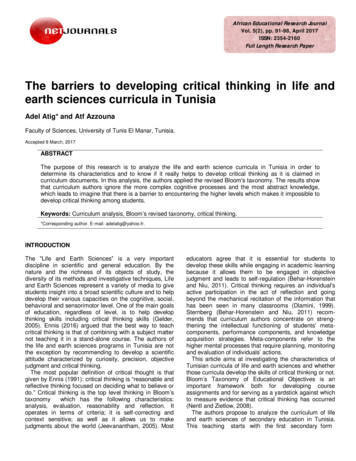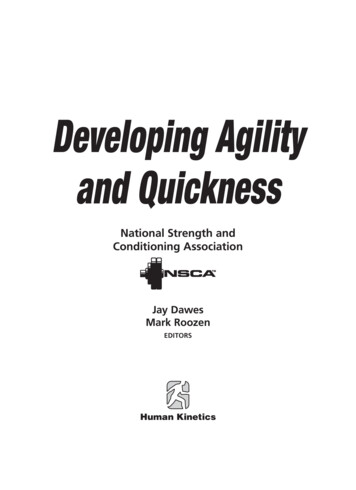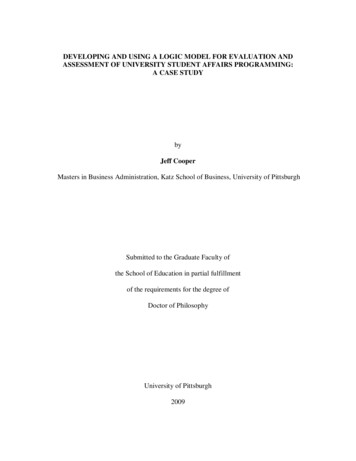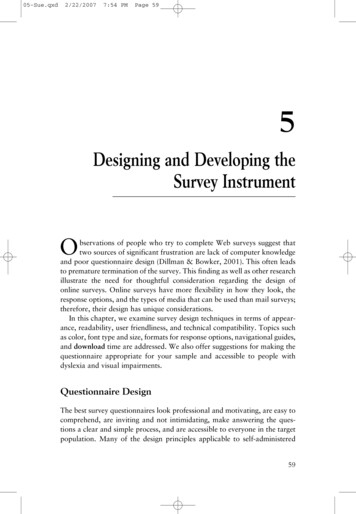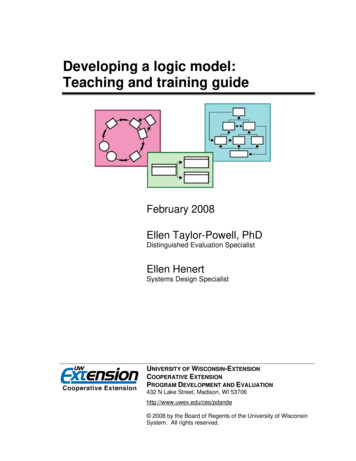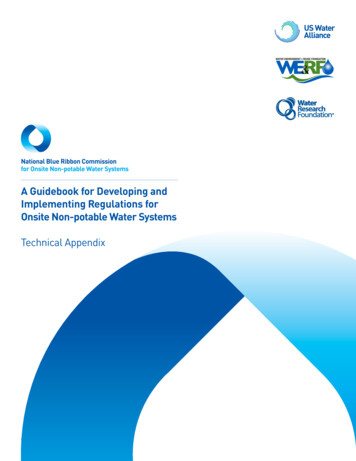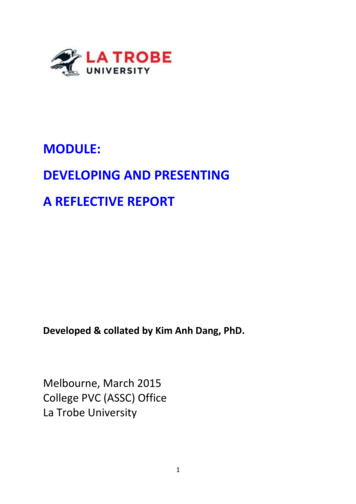
Transcription
MODULE:DEVELOPING AND PRESENTINGA REFLECTIVE REPORTDeveloped & collated by Kim Anh Dang, PhD.Melbourne, March 2015College PVC (ASSC) OfficeLa Trobe University1
CONTENTSACKNOWLEDGEMENT . 3INTRODUCTION TO THE MODULE . 4MODULE OVERVIEW . 4GUIDE TO THE MODULE. 5MODULE INTENDED LEARNING OUTCOMES . 5GRADUATE CAPABILITIES . 6SUMMARY OF LEARNING ACTIVITIES . 6ASSESSMENT . 7TEACHING AND LEARNING RESOURCES . 8MODULE MATERIALS . 9PART 1 ‐ WHAT: DEFINITION OF REFLECTION AND REFLECTIVE WRITING . 91.1.What is reflection and reflective practice? . 91.2.What is involved in the reflection process? . 121.3.What is reflective writing?. 16PART 2 ‐ WHY: RATIONALES AND BENEFITS OF REFLECTION AND REFLECTIVE LEARNING21PART 3 ‐ HOW: FROM PLANNING TO EVALUATING A REFLECTIVE REPORT . 243.1. Planning: Understanding components of a reflective report . 243.2. Gathering data for a reflective report . 313.3. Writing a reflective report . 343.4. Evaluating your own and others’ reflective report. 38SOURCES OF MATERIALS AND REFERENCES . 44FURTHER READINGS. 46ANSWER KEYS . 472
ACKNOWLEDGEMENTThe developer would like to sincerely thank Peter Vitartas and Kurt Ambrose for theirinvaluable input, advice, suggestions and feedback on earlier versions of this module.3
INTRODUCTION TO THE MODULEMODULE OVERVIEWThe development of reflective skills is widely considered as a “valuable component ofstudent learning in higher education” (Ryan & Ryan, 2012, p. 1). Educational theorists, suchas Dewey (1933), Schön (1983), Van Manen (1995) and Bain, Ballantyne, Mills and Lester(2002), point out the importance of reflective practice in promoting deep learning. Thesetheorists also provide different modules to implement and develop critical reflection.At La Trobe University an increasing number of subjects across different disciplines anddifferent year levels require students to write reflectively. Reflective writing may form partof ongoing assessment or may be a core requirement of most or all assignments. Forexample, a subject in Education in Health Professional Practice requires students to write a1,500 word reflective report of teaching and learning sessions. As ano ther example, asubject in Accounting Work Placement similarly requires students to write a 1,000 wordreflective report. Many other subjects include other forms of reflective writing assessmentssuch as reflective portfolios (e.g., BUS3ELP – Business Experiential Learning Project),reflective diaries (e.g., CSE4IBL ‐ Industry Based Learning), or online reflective journals (e.g.,HUS1FFT ‐ Food For Thought Discovering the world through commodities’). Even thoughreflective writing forms an important part of assessment, many students may not know howto do it successfully.This module ‘Developing and presenting a reflective report’ provides students with relevantresources and knowledge to develop and present a reflective report. In particular, themodule will explore the concept of reflection and reflective reports, the benefits ofreflective writing, and the process of writing a reflective report. T hrough a range of learningmaterials, students will develop an understanding of key topics:‐WHAT is reflection? And WHAT is NOT reflection?‐WHAT are major reflection models? WHAT are key stages in reflection?‐WHAT is reflective writing? WHY reflection and reflective learning?‐HOW to write a reflective report? (From planning to evaluating a reflective report)4
Students will also learn how to write a reflective report from guided exercises, which leadthem through various steps in order to be able to construct a reflective writing reportindependently.GUIDE TO THE MODULEThe module can be used as a stand‐a‐lone module where students can be directed toindependent learning. The module materials are collated and developed for La Trobestudents, both undergraduate and postgraduate, cross different subject disciplines, whowant to learn about reflection and how to write reflectively.This module is also suitable for a subject coordinator to embed in their own subject forassessment, or as a requirement for students in subjects that employ reflective writing aspart of assessment. Subject coordinators may also wish to adapt the module to specificstudents’ learning needs in their subject.MODULE INTENDED LEARNING OUTCOMESUpon the completion of this module, students should be able to:1Demonstrate an understanding of what critical reflection is and why it is important todevelop reflective skills.2Describe features of reflective writing and key steps involved in planning anddeveloping a reflective report.3Apply the 4R’s reflective thinking model (Reporting, Relating, Reasoning, &Reconstructing) to preparing and developing a reflective report.4Analyse samples of reflective writing for strengths and weaknesses.5Evaluate their own and others’ reflective writing against the rubrics and features ofreflective writing.5
GRADUATE CAPABILITIESThe following Graduate Capabilities are developed and embedded in this subject:Graduate CapabilitiesGraduate Capability Point1Literacies and Communication SkillsWriting2Inquiry and Analytical SkillsCritical Thinking, Inquiry/Research3Personal and Professional SkillsAutonomy and independence; Study andLearning Skills4Discipline specific Knowledge andSkillsKnowledge about Reflection andReflective WritingSUMMARY OF LEARNING ACTIVITIESThis module comprises three parts. Part 1 – WHAT: Definition of reflection and reflectivewriting explains what reflection and reflective practice is; what is involved in the reflectionprocess; and what reflective writing is, including key components of a reflective report. Part2 ‐ WHY: The rationales and benefits of reflection and reflective learning describes the roleof reflection and reflective learning in higher education. Part 3 – HOW: From planning toevaluating a reflective report prepares students to write a reflective report by consolidatingtheir understanding of reflective writing and key components of a reflective report. Part IIIwill take students through different writing stages, from planning and gathering data to thefinish.This module comprises various learning activities, from readings to a range of tasks andexercises. Within this module, following Richards (2015), tasks are learning activities thatbuild on students’ existing skills and knowledge, or those resources that have been providedin pre‐task work. Tasks may generate outcome which is not simply linked to reflectingwriting though students may learn about different aspects of writing as they carry out thetasks. In this module the tasks may include watching videos, completing quizzes, or carryingout an online search. Exercises involve controlled, guided or open ended practice of some6
aspect of writing, directly related to writing. In this module, the exercises may involveanalyzing a piece of reflective writing or generating data to write a reflective report, orevaluating reflective writings.ASSESSMENT1) Assessment Task 1 (35%)Prepare a 10‐min recorded PPT presentation about your reflection on studying thismodule ‘Developing and Presenting a Reflective Report’.Use the 4Rs Model (Reporting, Relating, Reasoning and Reconstructing) to guideyour preparation.2) Assessment Task 2 (65%)Write a 500‐word reflective report on your learning experience in this module of‘Developing and Presenting a Reflective Report’.‐Use the 4Rs Model (Reporting, Relating, Reasoning and Reconstructing) to guideyour preparation and writing.‐After you have completed your report, use the rubric introduced in Part III toevaluate your own writing. In which areas have you done well? In which areas didyou still experience much difficulty? Why? How to improve in your next reflectivewriting assignment?7
TEACHING AND LEARNING RESOURCESRESOURCES AT LA TROBE UNIVERSITY FOR STUDENTS (Retrieved March ice/reflecting 030.htmlOTHER RESOURCES FOR STUDENTS1) Monash University (Retrieved March /medicine/reflective/3.xml2) The University of Queensland (Retrieved March 2015)https://wiki.qut.edu.au/display/draw/Common resources3) The University of Melbourne (Retrieved March types/reflective/4) University of Portsmouth (Retrieved March oduction.pdf5) Office for Learning and Teaching (OLT), Australian ) The Royal Australasian College of Medical tion com content&view article&id ing&catid 2:college‐regulations‐and‐guidelines&Itemid 133RESOURCES FOR TEACHING STAFFActivities to teach reflection: group activities, individual activities, and much more.http://www.uvm.edu/ dewey/reflection manual/activities.htmlhttp://www.uvm.edu/ dewey/reflection lay/draw/All Patterns8
MODULE MATERIALSPART 1 ‐ WHAT: DEFINITION OF REFLECTION AND REFLECTIVE WRITING1.1.What is reflection and reflective practice?Writing reflective journals, entries, diaries, portfolios and reflective reports all involvesthinking about your studies in relation to your own ideas and beliefs. In higher education,reflective journals, portfolios and reports are examples of written tasks that have been usedvariously to enhance your reflective capacities and make explicit the implicit (Schön, 1987).1Reflection is an important part of learning whether you consciously do it or not. Reflection isnot only a description of 'what you've seen' or 'what you've done', but rather it is a processof drawing comparisons with what happened, and with what you already know, relatingthis experience to the theories you have been introduced to and modifying your ownideas and professional practice in light of this reflection.2Reflection has been described as a process of turning experience into learning. That is, ofexploring experience in order to learn new things from it. Reflection is described as 'thoseintellectual and affective activities in which individuals engage to explore their experiencesin order to lead to new understandings and appreciations.' (Boud, Keogh and Walker1985:19)3Reflection is a “complex, rigorous, intellectual, and emotional enterprise that takes time todo well” (Rodgers, 2002, p. 845). Reflection, or reflective practice, has a long tradition andstems from philosophy, particularly the work of Dewey (1933) on reflective thinking forpersonal and intellectual growth. Dewey’s approach is considered to be psychological, and isconcerned with the nature of reflection and how it occurs. Schön’s (1983) work on thereflective practitioner has also influenced many scholars interested in the work of1Adapted from Ryan and Ryan (2012, p. 2)Source: aterials/reflective%20practice/reflecting 030.html3Source: http://www.racma.edu.au/index.php?option com content&view article&id ing&catid 2:college‐regulations‐and‐guidelines&Itemid 13329
professionals and how ‘reflection‐in‐action’ and ‘reflection‐on‐action’ can influence theirprofessional education. Such diverse theoretical underpinnings mean that reflection ismulti‐faceted and can be interpreted in various ways (Fund, Court & Kramarski, 2002;Moon, 1999). Academic reflection, which generally involves a conscious and stated purpose(Moon, 2006), and needs to show evidence of learning, comprises various level of reflection,such as Reporting, Relating, Reasoning and Reconstructing (to be elaborated in Section 1.2),and must ultimately reach the critical level for deep, active learning to occur.44Adapted from Ryan and Ryan (2012, pp. 2‐3)10
1.1.1. Task 1: Watch the videosVideo 1: Reflective writing – A very brief guideQuestions: What is reflection? & What is NOT reflection?https://www.youtube.com/watch?v X1xkFgHAWD0Video 2: ‘What is reflective learning?’Questions: What are two main types of reflection? Can you explain them?https://www.youtube.com/watch?v XIsznZR4hzY11
1.2.What is invo
reflective diaries (e.g., CSE4IBL ‐ Industry Based Learning), or online reflective journals (e.g., HUS1FFT ‐ Food For Thought Discovering the world through commodities’). Even though reflective writing forms an important part of assessment, many students may not know how to do it successfully. This module ‘Developing and presenting a reflective report’ provides students with relevant .
